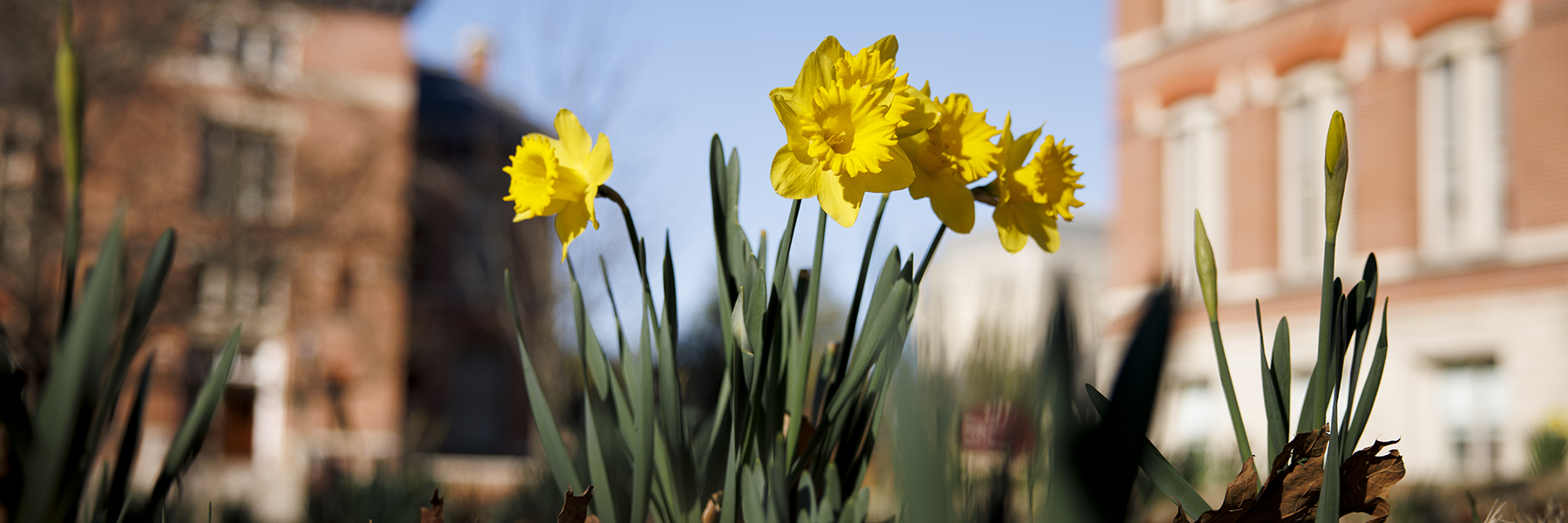State of the Campus
April 4, 2023
Welcome. Good afternoon, everyone.
I am thrilled to be here this afternoon, as drawn in the BFC constitution, to report on the state of the Bloomington campus.
A preview: we are resilient, creative as ever, and ready to chase new heights of student success, transformative research and creativity, and service to our communities across Indiana and the world.
It’s been just over a year since I returned to my alma mater. I genuinely appreciate the colleagueship and collaborative spirit I have felt from each of you, along with faculty, students, staff, alumni, and so many others here. Thank you.
As I did in my experience at IU as a doctoral student, I have again seen and felt the pride, creativity, and incredible sense of place that make this campus the hub of research, learning, and global influence that it is.
I knew then—and know even more fully today—that IU Bloomington is truly special.
Special—for the more than 200 years our predecessors and colleagues have pursued dreams to build a beacon of knowledge, learning, and culture in Bloomington, Indiana.
Special—for the creative risks these scholars have taken to light new pathways, build innovative programs, and struggle in service of what’s important and just.
Special—for the indelible impact we continue to have in the arts, music, humanities, and culture; through the Kelley School and Maurer, and Education; in media and informatics, in the sciences, new technologies, and public health; and more; and in nurturing deep relationships with learners and communities around the world.
I have enjoyed and benefited greatly from this special legacy of intertwined academic courage and compassionate community, and I’m honored now to help guide it. Over the past year, it’s been a privilege to join President Whitten as we more thoroughly explore how our history and longtime strengths are expressed today—and how they may shape a brighter future for us together.
IUB and Higher Education
We live in a rapidly changing, increasingly interconnected—yet often sharply divided—world.
New advances, seemingly each day, bring previously unseen possibilities to the fore—but also bring challenges, in promoting health and well-being, building shared community and understanding, and fostering a more equitable, just society.
Just to note: GPT4 was not involved in the drafting of this report.
In some ways, we are still emerging from the pandemic, recalibrating to a new, new normal. Familiar, but not fully like before.
Across society today, there is great skepticism about much of our work and its value. As costs have continued to rise, students, families, donors, and other funders have rightly asked about our commitment to student success, our commitment to finding solutions to today’s greatest challenges, our commitment to making our communities more resilient, and life on earth more fulfilling.
Yet in a world increasingly driven by knowledge, innovation, and rapid shifts in how we live, work, and play, higher education has an ever-greater role in the success of individuals and the future of our society. Along with the difficult challenges higher education faces, we also have unprecedented opportunities. It is up to us to take the bold steps that will help us rise to meet our potential and propel IU forward.
As faculty, staff, students, and leaders at IUB, we show up every day to make a difference. We are deeply committed. We propose solutions. Provide creative opportunities. Select methodologies. Dance. Challenge convention. We experiment. Practice. Fail. Succeed. We learn. We inspire others. We grow.
The creative risks we each take every day—all over campus—to advance research, enhance teaching and learning, and stimulate service all come with the knowledge that the process of creating and changing almost always stretches us.
Until we learn what more we can become.
A Strategic Vision for IU
It is in that spirit that we prepare this spring to embark on a new strategic vision for Indiana University and our Bloomington campus.
It is a vision we have forged together over many months as we have brought forth ideas, considered difficult questions, and wrestled with often competing visions, interests, priorities, metrics, and timelines.
I know by now you are familiar with the pillars of our collective effort. And I trust you share the same aspirations.
As we move into the last stages of finalizing our IUB 2030 plan, I look forward to joining our faculty, academic deans, and faculty leaders through shared governance, including Cate Reck, Colin Johnson, Marietta Simpson, and our incoming BFC president-elect, Danielle DeSawal, to bring our collective vision to life.
Student Success
Our priorities for undergraduate, graduate, and professional students alike hinge on the connections and mentorship — among peers, faculty, and staff — that promote retention, progression, graduation, and lifetimes of success and fulfillment.
Today, as we begin work to realize our vision, we are introducing a series of steps to more strategically align campus resources and learning opportunities at IUB to improve student success and enhance the overall student experience.
First, today I am excited to share that we are committing to expand experiential learning opportunities for undergraduate students.
It was here at IUB that George Kuh, Chancellor’s Professor Emeritus, laid the foundation for understanding how high impact practices lead to favorable student outcomes. This is now one of the many areas in which we are building on our strengths to lead for the future.
From the moment a student is admitted to IU and throughout their academic career, we must offer sustained and consistent access to curricular and cocurricular experiential learning, which includes faculty-mentored undergraduate research, internships in emerging careers, and community-engaged learning. These highly impactful experiences provide invaluable practice and prepare our students for careers of the future.
Experiential learning has been hallmark to the success of Leilanu Jackson, this year’s Wells Awardee, who graduated in December with a degree in environmental management from the O'Neill School. During her undergraduate career, she assisted in research with the Environmental Justice Complaints Project, where she led the investigation of more than 1,000 environmental quality complaints. She also interned with the Grant County Health Department, where she created a CDC-recommended behavioral questionnaire and expanded and facilitated 4 asymptomatic COVID-19 testing sites. Now, she’s pursuing a Master of Public Affairs at O’Neill and continues to make IU and our world a better place.

Second, beginning this summer, we are creating a new campus-wide office dedicated to improving the experience of all students at IUB—undergraduate, graduate, and professional—combining the current Student Affairs, IU Corps, and student-facing Residential Programs and Services portfolios.
This new Office of Student Life will center on three guiding themes, core to our emerging strategic vision:
- Health and Well-being
- Student Care and Advocacy
- Involvement and Belonging
I am eager for the opportunities this new structure presents in terms of uniting support across schools. Through closer collaboration with faculty and academic leaders, we can more fully bridge academic and campus life, better serve diverse student populations and groups, improve student health and well-being, engage with students more proactively, and foster stronger connections for students with each other and across the IU community.
Third, we are advancing our efforts in the Office of Undergraduate Education to ensure the best alignment with our strategic vision and position us to increase equity and improve success across student populations.
To lead these efforts, I am elated to announce that Vasti Torres has agreed to serve as Acting Vice Provost for Undergraduate Education, beginning this summer. Torres succeeds Dennis Groth, who will return to his role as Professor of Informatics in the Luddy School this July.
Torres, who currently serves as professor of educational leadership and policy studies and executive associate dean at the School of Education, comes to this position with a wealth of experience leading student success initiatives, developing innovative pedagogy and scholarship, and mentoring student scholars. Her research expertise focuses on student success in higher education and identity development in college.
We have two important aspirations here – the first is lifting the ceiling so our top students have opportunities to challenge themselves to their limits.
Our Hutton Honors College and other scholarship programs that serve our highest achieving students are essential to addressing this first objective
As part of this new alignment for student success, we are elevating the Hutton Honors College to report directly to me, as Provost, and adding the Dean to our campus leadership team.
I am thrilled to announce today that Rebecca Spang has agreed to serve as Acting Dean of the Hutton Honors College, beginning this summer. Spang succeeds Andrea Ciccarelli, who will return to his role as Provost Professor in French and Italian on the College faculty.
Spang, who currently serves as the Ruth N. Halls Professor in the Department of History and the director of the Liberal Arts + Management Program (LAMP), is a world-renowned scholar, recognized as the leading American historian of her generation working on the history of 18th- and 19th-century France and the French Revolution. Most recently, Spang was selected as a 2023 New America National Fellow and a 2022-23 Guggenheim Fellow, as well as receiving recognition this spring as Distinguished Professor at IU.
I am particularly excited for this opportunity for IUB to increase the visibility of our Honors program and redouble our efforts to attract and foster the success of the best and brightest students from across Indiana and around the world.
The Honors College will also now oversee major scholarship programs for our highest achieving students.
Second, to reinforce the foundation we provide for all of our students, we must create a support system that ensures students who are equally talented but may not have had the same opportunities as others, have the fullest chance of success.
To that end, today we are also introducing a new initiative in undergraduate education to improve academic success at IUB. I am committing $750,000 over three years to improve student academic success in courses that have the highest failure and withdrawal rates. This effort will be led by VPUE, with additional details to share in the coming days.
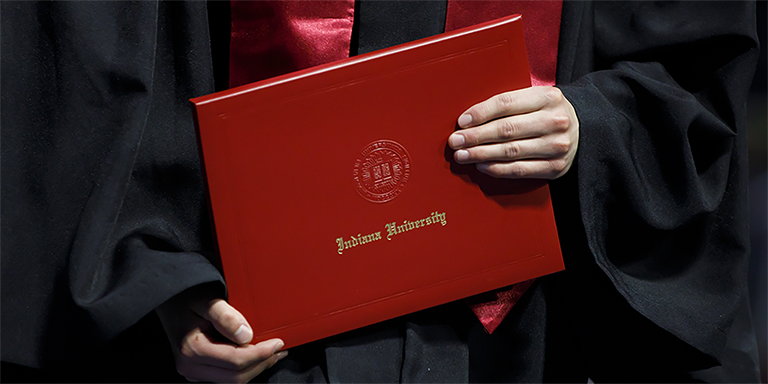
Next, I am excited to announce today that,following a campus-wide search and recommendations from the search committee, David Daleke has accepted the new position of Dean of the Graduate School and Vice Provost for Graduate Education, beginning May 1.
Daleke has served as vice provost for graduate education and vice provost for health sciences since 2013, as well as associate dean of the University Graduate School starting in 2005. He is also a Professor of Biochemistry and Molecular Biology at the IU School of Medicine in Bloomington.
David will work closely with faculty and leadership across all these areas, as well as the University, regional, national, and global external partners to strengthen graduate education and improve student success across disciplines at IUB.
When it comes to graduate education, we have made strong progress over the most recent year, particularly related to stipends, well-being resources, and pathways to address grievances, but we have the highest ambitions ahead.
To reduce student costs and enable more timely career launch, we have the potential to significantly reduce median time-to-degree.
To meet the aim of better preparing graduate students for dynamic careers, including outside of academia, we need to prioritize supporting students in attaining relevant assistantships and taking advantage of career development opportunities, along with designing more flexible curricula and offering mentorship training for faculty.
Alongside our efforts to create new, innovative accelerated master’s programs (of which we now anticipate more than 50 for next fall), as well as new high-demand interdisciplinary master’s degrees (such as the new microelectronics and nanotechnology degrees we introduced last week), today I am pleased to announce a new $1 million incentive program for schools and departments to spark new degree innovations in online, hybrid, and low-residency formats. This effort will be led by the new Graduate School, with additional details to share in the coming days.
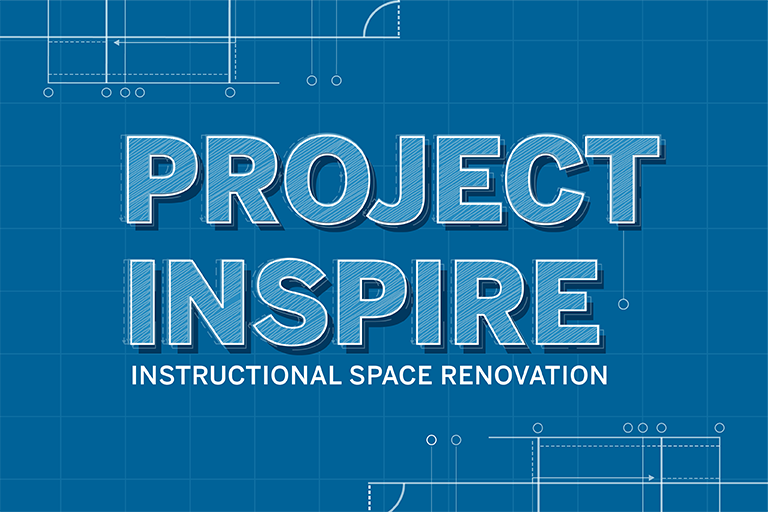
Finally, we are committed to improve our learning spaces across campus. Project Inspire is a long-term effort toward intentional, strategic renovation of instructional space. We have already invested more than $1 million this year in the school of music and have several additional projects in the planning stages.
Through these efforts and beyond, we are committed to continually assessing the quality of involvement in academic and campus life and leveraging the strengths of our campus, state, and global connections to support all students in meaningful development of their networks and skills. We know learning extends far beyond the classroom, so we must create a nurturing and supportive environment across IUB where students’ needs are met, their aspirations are encouraged, and their ventures are championed.
Clearly, it is a wonderful time of new opportunity and collaboration toward creating an even more meaningful and one-of-a-kind student experience at IUB.
Transformative Research and Creativity
To create a better future, we must also rapidly accelerate our scholarship, particularly in the sciences, technology, and health, and expand connections for creative activity across the campus.
With the upcoming appointment of a new Vice President for Research, who will drive innovation across IU, and an upcoming search for a new Vice Provost for Research to serve IU Bloomington, we renew our commitment to surround all scholars, in each stage of their career, with the resources they need to flourish in research and creative pursuits. This includes taking a fresh look at our research enterprise and addressing gaps in infrastructure and services to better support research and creative activity across disciplines.
I am excited to announce today a new $1 million commitment from the campus toward additional support for grant proposal development. It is critical that we have trained, dedicated staff aligned with grant-seeking faculty, pre- and post-award. This new funding will establish a Pre-award Services Team, hired and trained centrally, which can be deployed to assist faculty and units based on priorities set by campus strategic planning and to support gaps in coverage available in a given unit.
We are also expanding efforts to pursue large-scale grant funding, forge inter-institutional partnerships, plug into multi-sector innovation ecosystems, and translate our groundbreaking research into systems and products that make our world a better place.
In this effort, we must also continue to strengthen our faculty and our vibrant research and teaching community by supporting faculty development and hiring new faculty in strategic positions.
With the direction and support of President Whitten, we began this effort last semester through the first phase of Faculty 100. In the first phase of this initiative, campus faculty and deans submitted 75 proposals, from which 29 new faculty positions were selected for funding. Departments are continuing to recruit impressive candidates for these positions.
Today, I am pleased to announce the broad outlines of the second phase of Faculty 100 at IUB.
This second phase, as shared previously, will prioritize new hires in alignment with two goals.
The first is to expand our capacity to pursue research priorities defined through our 2030 planning process. These include the improving the health and well-being of older adults, building on our expertise in artificial intelligence, advancing discoveries through quantum technology, and preventing human disease and preserving natural resources through environmental health initiatives.
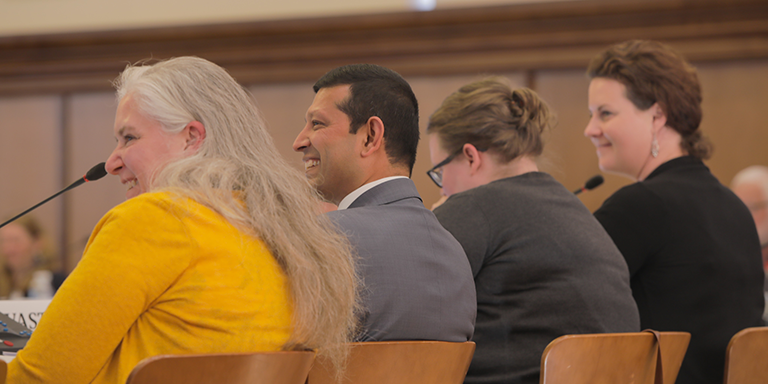
The second goal is to develop new academic programs or expand existing areas projected to see greater student interest and aligned with workforce demands.
In this second phase, we expect to “get to 100” – and bring these new colleagues here as quickly as possible so that they can begin contributing to our community.
We expect these intentional hires to expand capacity, not only providing a greater volume of work in areas of strategic importance, but leading to denser, more impactful collaboration within and among departments. Such an increase in capacity has the power to improve the undergraduate experience, grow graduate education, and amplify the translational impact of research.
It’s important to remember that these efforts complement the seven-year, university-wide Presidential Faculty Diversity Hiring Initiative, as well as traditional faculty recruitment cycles, through which we also continue to bring in many talented new colleagues.
Here I would like to celebrate the example of Eduardo Brondizio, a Distinguished Professor in the Department of Anthropology who was recently elected to the National Academy of Sciences. He is also an elected member of the American Academy of Arts and Sciences and a fellow of the Society for Applied Anthropology. Somehow, in addition to directing the Center for the Analysis of Social-Ecological Landscapes and serving as a Senior Fellow at the Ostrom Workshop, he co-chaired the Global Assessment Report of the Intergovernmental Platform on Biodiversity and Ecosystem Services. Through research, teaching, and service, Eduardo consistently contributes to the diverse ecosystem of investigation and innovation that characterizes our faculty.
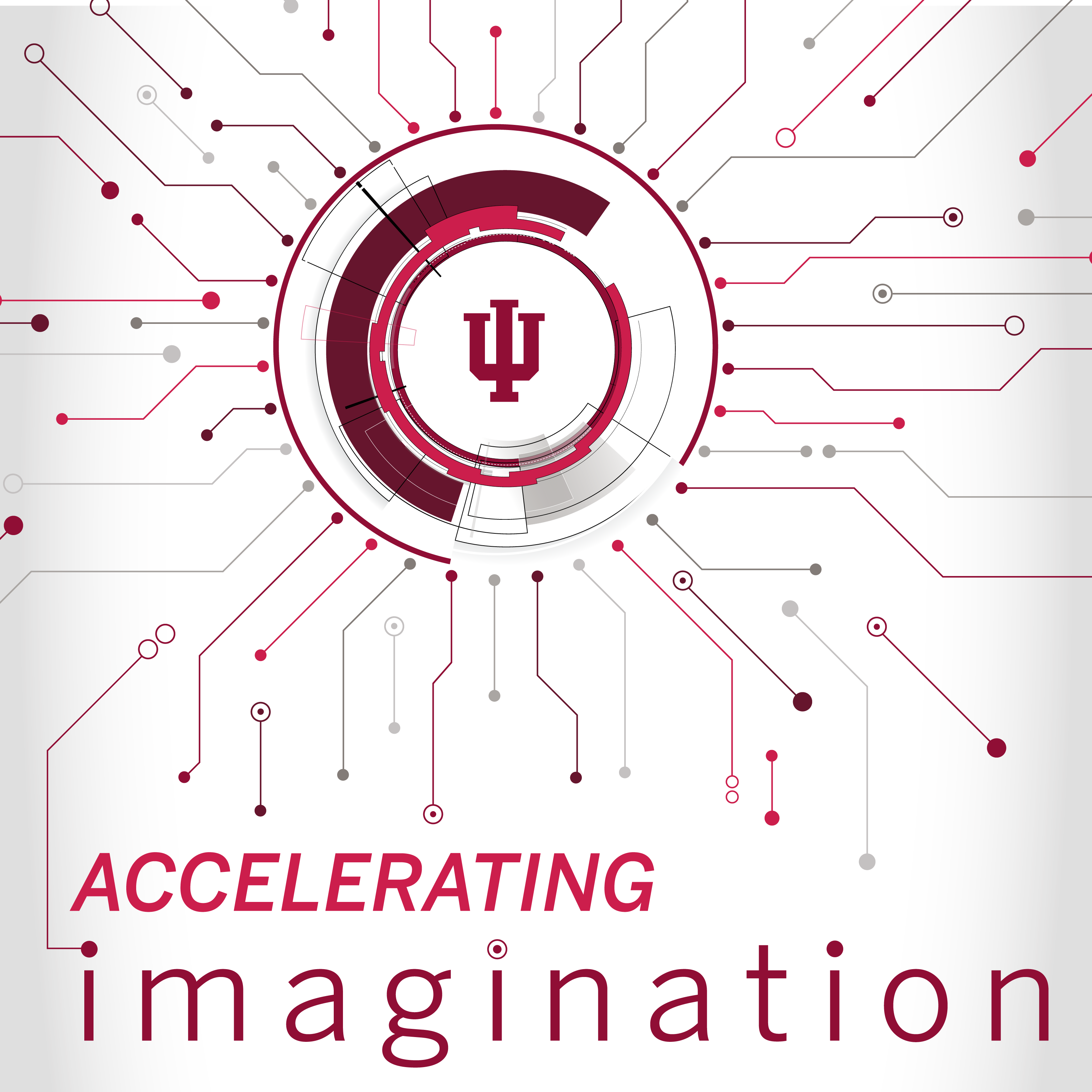
To further enhance our research, I hope you also saw the recent launch of our human-centered AI project: Accelerating Imagination.
Our goal with this effort is to position IU as a leading partner for human-centered AI research, education, and workforce development efforts that improve Indiana and the world. Accelerating Imagination is designed to catalyze the application of AI to problems our faculty already study.
To turn to a parallel and interconnected example on campus, you may be familiar with the Statistical Consulting Center, which has for many decades made statistical knowledge and tools accessible for researchers. Likewise, this initiative is designed to help you apply AI to whatever problem or field of study you pursue – building on a flourishing culture of human-centered AI, high-performance computing, and technology research and teaching here at IU.
The connective quality of this project will empower us to deploy AI-based solutions for a wide range of applications that can support the work of faculty, industry, and governmental agencies, among others.
The Luddy Artificial Intelligence Center, which held its opening celebration last month, serves as a campus hub for this research, which ranges from bioinformatics to cognitive science and computer vision to deep learning.
Multidisciplinary teams of IU researchers are already using AI to enhance P-12 education through AI Goes Rural and the NSF AI Institute.
Moving forward, a new executive committee composed of representatives across schools and departments will work to:
- expand partnerships with a wide range of industries throughout the state, including Crane;
- scale up strengths in social sciences, business, and arts and humanities as they relate with artificial intelligence; and
- accelerate IU’s entrepreneurship and commercialization efforts.
The Accelerating Imagination executive committee includes:
- David Crandall, Luddy Professor of Computer Science and director of the Luddy Artificial Intelligence Center
- Michael Huber, Vice President for University Relations
- Joanna Millunchick, Dean of the Luddy School
- Kosali Simon, Herman B Wells Endowed Professor and Paul O’Neill Chair in the O’Neill School; and Associate Vice Provost for Health Sciences
- Ash Soni, SungKyunKwan Professor, Interim Dean, and Professor of Operations & Decision Technologies and the Kelley School of Business
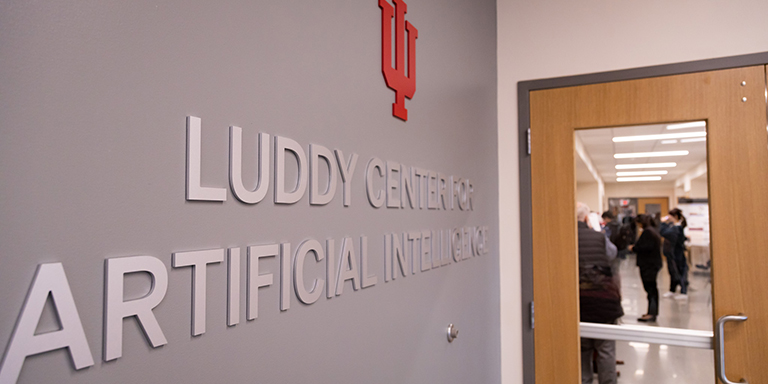
At IU, we also have amazing opportunities to enhance the impact of our creativity activity and make new connections across all that we do.
IU Bloomington has long been known for our excellence in the arts, culture, humanities, and creative activity, which makes this town and the university unlike almost anywhere in the world.
We are honored to host one of the world’s most prestigious schools of music at Jacobs; world-class museums, like the Eskenazi Museum of Art; priceless collections and libraries, like the Lilly Library; field-leading scholarship and creativity activity across the humanities; and hundreds of annual performances, exhibits, colloquia, and much more, from Granfalloon on.
To me, what clearly distinguishes IUB within the highest tier of America’s public research universities is specifically the depth of creativity and expertise in the arts, humanities, and culture that we can bring to every possible solution, to enrich every member of our community.
To that end, today I am announcing a new executive leadership committee for the arts, humanities, and culture at IUB, which includes a core of group of academic deans and faculty leaders:
- Abra Bush, dean of the Jacobs School of Music
- Peg Faimon, dean of the Eskenazi School of Art, Architecture, and Design
- David Brenneman, Director of the Eskenazi Museum of Art
- Gloria Howell, Director of the Neal-Marshall Black Culture Center
- Brenda Weber, Provost Professor in Gender Studies and Director, College Arts and Humanities Institute
- Ed Dallis-Comentale (ex-Officio), director of the Arts and Humanities Council
This group will be charged with providing strategic vision and recommendations to advance the arts, culture, humanities, and collections across our IU community, both in their own rights and to surface new interdisciplinary strengths and foster new collaborative opportunities.
Let’s absolutely continue and grow our longtime excellence in these vital areas, and let’s also apply our treasures and genius to meet today’s and tomorrow’s opportunities for our students and the world.
Think music and virtual reality. Gender studies and brain science. Ethics and machine learning. The ways in which our creativity can be integrated are nearly limitless.
Across our research and innovation enterprise, our opportunity today at IUB, to position us to continue to lead for the future, is to build on our historic strengths innovatively and collaboratively.
Service to Indiana and Beyond
Profoundly connected with student success and research and creative activity, our goal and duty as Indiana’s university is to ensure students, staff, and faculty have the connections and resources necessary to meaningfully collaborate with communities near and far.
This centers on our distinct capacity to mobilize our expertise and resources in support of quality of life and quality of place — in Indiana and around the world.
More than ever before, we can and need to be in economic development committees, community resilience meetings, health care settings, and P-12 classrooms.
Our priority is to support this generation of educators, engineers, and health professionals while training the next generation and remaining ever-agile in anticipating and meeting workforce needs.
We are fortunate to have longtime relationships and hubs in leading global centers, and in emerging areas internationally, to drive engagement and impact.
We also have incredible opportunities to collaborate with our fellow IU campuses, the emerging IU Indianapolis and the School of Medicine, to multiply our impact.
Concurrently, we are serious about leveraging our historic strengths, as well as our emerging opportunities, to creatively make Bloomington and the surrounding region a more vibrant place to live and thrive.
In the coming weeks, we will launch new efforts to strengthen workforce development and foster a more connected community of idea generators and activators.
Together, I know we will make Indiana and far beyond better places to live, work, and serve.
Our Collective Commitments
Across all these pillars, there are core values and commitments we must make together.
We must commit to Diversity, Equity, and Inclusion. We must stand for full representation. And fight to ensure that all members of our community—from our Asian and Pacific Islander communities to our LGBTQ+ peers—are included and have the fullest opportunity to succeed and flourish.
We must commit to Academic Freedom. This is a site of inquiry and discovery, of debate and dissent, of open and free expression for our faculty, who necessarily must be able to challenge and pursue knowledge wherever it leads.
We must commit to Interdisciplinary Collaboration. In service of that learning and growth, we must expand the volume and strength of our collaborations —
- across the IUB campus, and across IU;
- with industry, nonprofit, and governmental partners;
- with our families, alumni, and supporters;
- and in cooperation with communities from South Central Indiana to regions around the globe.
We must commit to Creativity and Adaptability. We must be committed to growing our flexibility and capacity to make quick, nimble programmatic and operational adjustments in line with the most pressing societal needs and exciting opportunities.
Today and moving forward, our university has the opportunity and potential like never before to respond to urgent challenges, as well as proactively improve conditions for life everywhere.
We must commit to Honor and Lift Our People. Throughout, we must honor and lift our people—the force driving all that we do. Faculty, staff, and students from across the university will be at the forefront of our efforts and essential to our success.
In recent months we have launched exciting initiatives to hire new faculty leaders and improve the staff experience. We will continue to build on these critical efforts in the days ahead.
Last semester I was fortunate to participate in the staff honors ceremony where we recognized the best among us. While every honoree was much deserving, one that I remember clearly was Tim Womock, who has served IU as the Facility Coordinator for the Neal-Marshall Black Culture Center for the past 15 years, part of a 33-year IU career. Colleagues describe Tim as tirelessly hard-working, compassionate, funny, and thoughtfully supportive. One of his Staff Merit recommenders said, “Tim goes the extra mile -- not because he wants accolades or recognition but because he has a heart of gold and wants to see our students succeed.”
And crucially, we depend on Tim and our colleagues in every school and in every department. Your expertise and experience—our collective expertise and experience—will be invaluable in enabling the collaboration and innovation that fulfilling our vision will require.
A Call to Action
I fully appreciate and own that our aspirations will not always come easily. That we exist in a moment of change, across IU and across the world, that can feel uncertain.
But if there is one unmistakable element of the IUB spirit, it is care for one another. In fact, at the Senior Recognition Brunch a couple weeks ago, each student who spoke celebrated our campus’s caring culture. No matter the challenges and uncertainties we encounter, we are kind and compassionate and lift up our fellow Hoosiers.
I cannot adequately emphasize my gratitude for all you have devoted to making Indiana University Bloomington a beacon of impactful research, innovative teaching and learning, and positive global influence.
Because of your willingness to take creative chances on discovery, your conviction in pursuing our aspirations, and your dedication to show up to make a difference, I am assured we have the brightest future ahead.
I am humbled and overjoyed for the opportunity to be here—to come together with you in a shared vision, learning from and with every cohort of students who join and graduate from this campus, exploring the reaches of innovation and creativity, and connecting always more meaningfully with each other and the world beyond our campus.
The state of our campus at IUB is resilient and ready to create a better future.
And I am eager to learn what more we can become.


